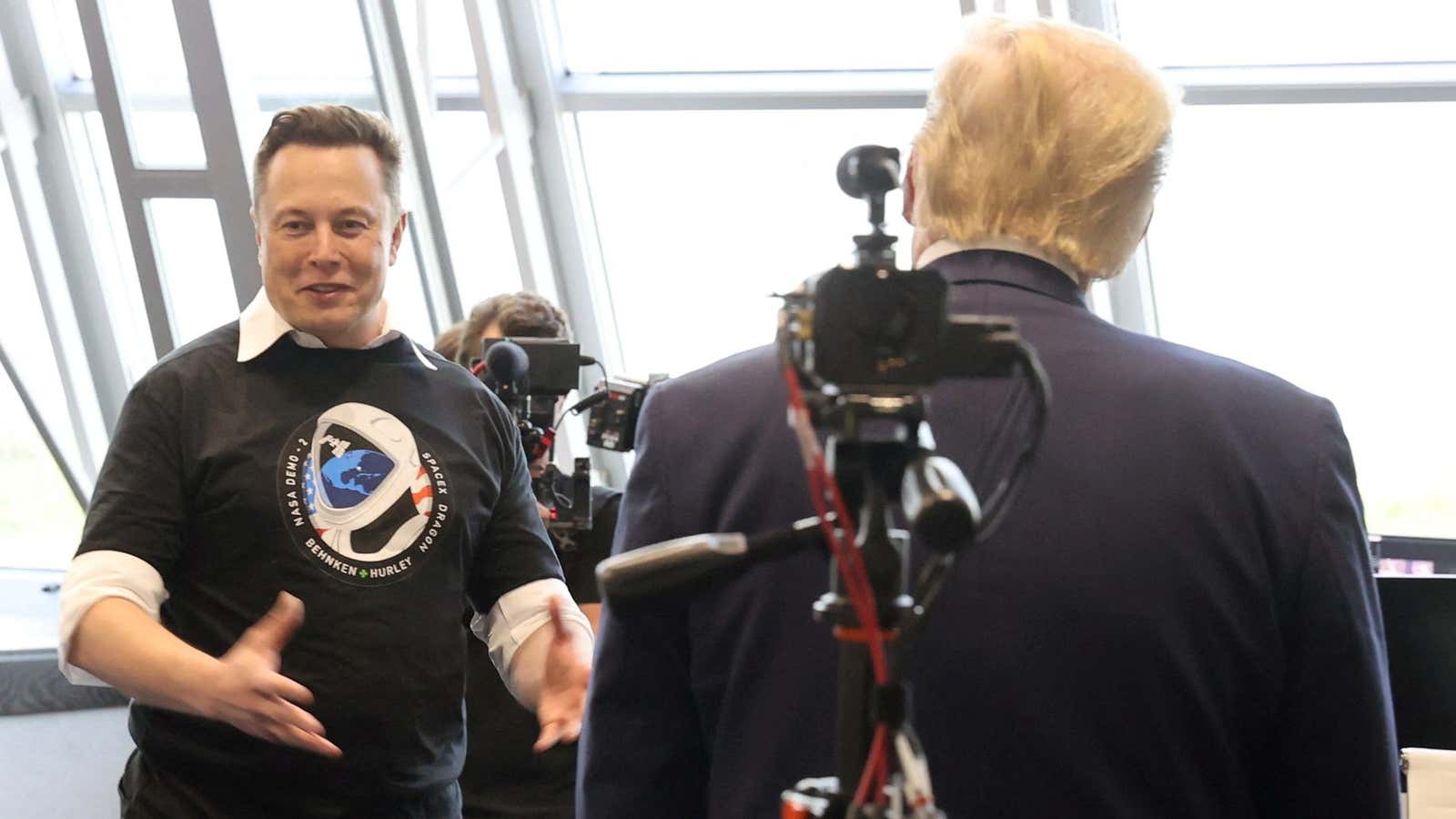Elon Musk wants to reinstate the Twitter account of former president Donald Trump, the billionaire Tesla and SpaceX CEO said at a Financial Times event on May 10. Musk, who is in the process of buying the popular social media website, said he disagrees with the decision to ban Trump from Twitter for inciting the violent takeover of the US Capitol last Jan. 6, a riot in which 150 law enforcement officers were injured and at least two killed, alongside several rioters.
Musk called the ban a “morally bad decision,” a “mistake,” and “foolish in the extreme.” He added it “alienated a large part of the country and did not ultimately result in Donald Trump not having a voice.” Banning him, he argues, only “amplified his voice among the right.”
But banning Trump was an apparent success for Twitter, at least for its stated aims. As a private company, Twitter is free to create rules for its users and enforce them—even if those users are world leaders. Before Jan. 6, Twitter repeatedly flagged Trump’s false tweets with warning labels and, in rare cases, removed them outright.
Twitter, citing content-neutral rules, finally banned Trump for inciting violence and praising the actions of insurrections. Despite Musk’s objection that banning Trump was a partisan act aimed at silencing the politician, there is evidence it succeeded in dramatically minimizing misinformation.
Social media is free to moderate speech
In the days after the Capitol riot, Donald Trump was banned not only from Twitter but also from Facebook, Instagram, YouTube, Snapchat, and Twitch. Twitter locked Trump out of his account on Jan. 6, as his tweets egged on insurrectionists at the Capitol before permanently suspending the outgoing president for “risk of further incitement of violence” on Jan. 8. While Facebook and YouTube have cleared pathways for Trump to return to the respective platforms, Twitter’s current management has not.
Musk, who indicates he plans to curb content moderation on Twitter and restore “free speech” on the platform, argues a permanent ban was unjustified, even if action against Trump was warranted. The executive implied Twitter’s decision to boot Trump off its platform was to silence a partisan voice, although rules do not specify politics or positions, but specify particular offenses such as inciting violence, committing abuse, or releasing non-consensual nudity.
“If there are tweets that are wrong and bad those should be deleted or made invisible, and a temporary suspension is appropriate, but not a permanent ban,” he said at the event, in his most definitive public statements since announcing his acquisition of Twitter in April. But defining “bad” and “wrong” will be far harder than Musk may think.
Bans dramatically reduce misinformation
Research firm Zignal Labs, which tracks the spread of false information on the internet, says the week following Trump’s expulsion saw online misinformation about the election plummet by 73% from 2.5 million mentions to 688,000 mentions across several social media websites. And in the year following Trump’s ban, mentions of the political conspiracy theory QAnon dropped 30% across Facebook, Facebook, and Reddit (where Trump has never had much of a presence but banned the popular subreddit r/TheDonald in June 2020.) While difficult to correlate, evidence suggests that political leaders are key to the spread of misinformation, as detailed extensively in one Harvard study from 2020.
De-platforming, the act of removing extremist voices from a social media platform to curb their ability to spread messages, is often effective at reducing someone’s reach. No one is preventing Trump from speaking. The former president has many, many outlets to reach his audience: his constant political rallies, conservative-branded social media platforms like his own Truth Social, and TV networks like Fox News that interview him.
But social media platforms like Twitter do algorithmically amplify voices, especially those at the extremes. When these platforms are taken away, their audience is diminished, even if someone’s ability to speak is not. One study (pdf) from researchers at Rutgers and Georgia Tech found that after alt-right personalities Alex Jones, Milo Yiannopoulos, and Owen Benjamin were banned from social media platforms, conversations about them fell significantly on those platforms.
If Trump cannot access his Facebook or Twitter accounts (and his Truth Social platform remains unpopular), Trump still holds significant sway in elections, regularly speaks at rallies, and is popular in key battleground states. When Twitter penalized Trump for repeatedly breaking the site rules, and inciting and glorifying violence during a coup attempt, it reduced a major source of information and perhaps dampened the immediate threat of violence. But Twitter’s removal of Trump did not give him less of a “voice,” as Musk describes it, just the ease of reaching a mass audience.
